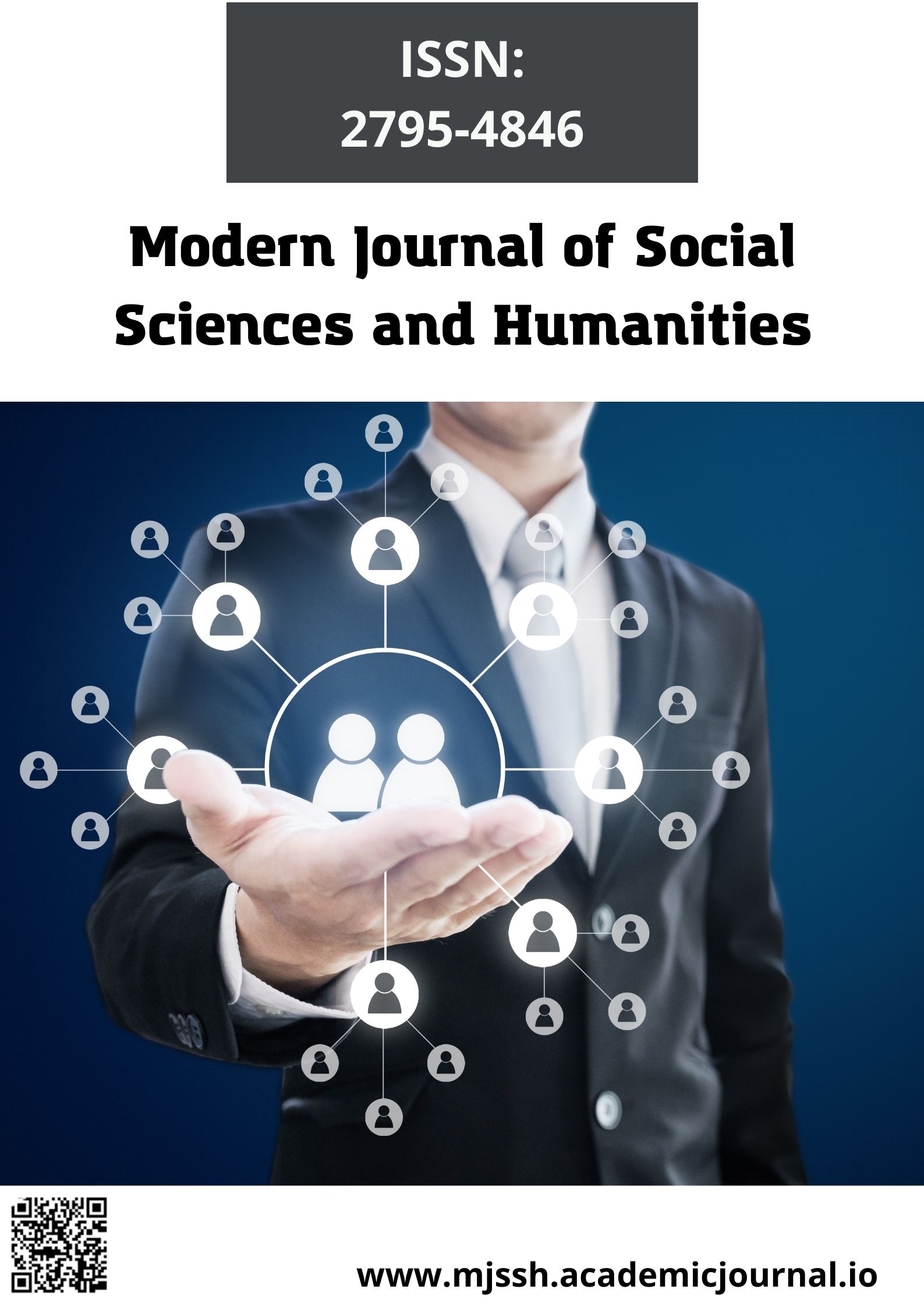THE PLACE OF CULTURAL CODES IN THE LANGUAGE VIEW OF THE WORLD
DOI:
https://doi.org/10.51699/mjssh.v1i5.285Keywords:
Linguistic view of the world, metaphorical sign, linguocultural codes, biomorph code, culture codes, spatial code, spiritual codeAbstract
The article presents linguocultural codes, their definitions, comments on linguocultural studies in Uzbek linguistics. It also gives a brief overview of the types of linguocultural codes and their definitions, as well as excerpts from the works.
References
Bolalar ensiklopediyasi. – Toshkent: “O‘zbekiston milliy ensiklopediyasi” Davlat ilmiy nashriyoti, 2018.
Большой фразеологический словарь русского языка. Значение. Употребление. Культурологический комментарий. / Ответственный редактор В. Н. Телия. – М.: АСТ-ПРЕСС КНИГА, 2006. – 784с.
Гудков Д.Б., Ковшова М.Л. Телесный код русской культуры. – М.: Гнозис, 2007.
Кононенко Б.И. Большой толковый словарь по культурологии. – М.: Вече, 2003.
Красных В.В. Коды и эталоны культуры (приглашение к разговору) // Язык, сознание, коммуникация: Сб. статей. –М.: МАКС Пресс, 2001.
Краснобаева-Чёрная Ж. В. Пространственный код культуры ценностной картины мира (на материале русской, украинской, английской и немецкой фразеологии) // Сибирский филологический журнал. – 2018. – №4.
Маслова В.А. Духовный код с позиции лингвокультурологии: единица сакрального и светского // Метафизика. – М., 2016. – №4. – С. 78-97.
Usmonov F. Oʻzbek tilidagi oʻxshatishlarning lingvomadaniy tadqiqi: Filol.fan. boʻyicha falsafa d-ri (PhD) ...diss. – Toshkent, 2019. –161b.
Худайберганова Д. С. Ўзбек тилидаги бадиий матнларнинг антропоцентрик талқини: Филол. фан. д-ри ... дис. – Тошкент, ЎзР ФА ТАИ, 2015. 58-бет
Xudoyberganova D. Lingvokulturologiyada madaniy kod tushunchasi va talqini//O`zbek tili va adabiyoti. – Toshkent, 2019. – №3. – B. 15.
Hoshimov O‘. Saylanma. 2 jildlik. 2-jild,
Qizi, Y. S. T. (2020). Religious speech and phonetic interference. ACADEMICIA: An International Multidisciplinary Research Journal, 10(6), 679-683.
Yusupova, S. T., & Anvarova, F. A. (2020). Linguoculturological investigation of zoonyms in English and Uzbek. ISJ Theoretical & Applied Science, 11 (91), 78-80.
Yusupova, S. T. (2019). CHARACTIRISTICS OF RELIGIOUS FUNCTIONAL STYLE OF THE UZBEK LANGUAGE. In АКТУАЛЬНЫЕ ВОПРОСЫ СОВРЕМЕННОЙ НАУКИ (pp. 20-21).
Roziqova, G. (2021). MAHMUD KASHGARIS «DEVONU LUGOTIT TURK» AND MODERN UZBEK LANGUAGE. Theoretical & Applied Science, (5), 222-225.
MAMAJONOV, А., & ROZIKOVA, G. (2018). Stylistics expressive speech system. Scientific journal of the Fergana State University, 1(4), 69-71.
ROZIKOVA, G. (2018). Non-traditional communication as a methodics instrument. Scientific journal of the Fergana State University, 1(3), 116-117.
Розикова, Г. З. (2016). Изучение процесса нормирования узбекского литературного языка синергетическим и квантитативным методами. Ученый XXI века, 32.
Hajiyeva, S., Shamilov, N., Isgandar, A., Gaziosmanpasha, H. M. D. T., Bayramov, G., & Lopez, M. C. EDITORIAL BOARD РЕДАКЦИОННАЯ КОЛЛЕГИЯ.
Gulbakhor, R. (2020). Expression of temporality and locality through noun lexemes in Mahmud Kashgari's “devon”. ACADEMICIA: An International Multidisciplinary Research Journal, 10(11), 1648-1653.
Rozikova, G. Z. (2019). SEMANTIC FEATURES OF LEXEMES BELONG TO THE GROUP OF NAMES OF PERSON APPLIED IN “DEVONU LUGOTIT TURK”. Scientific Bulletin of Namangan State University, 1(12), 136-141.
Roziqova, G. (2020, December). MAHMUD KASHGARI'S" DEVONU LUG'OTIT TURK" NAMES OF HOUSEHOLD ITEMS USED IN THE WORK EXPRESSIVE SYNONYM LEXEMAS. In Конференции.
Мамажонов, А., & Розиқова, Г. (2004). Гапларнинг шаклий-мазмуний тузилишига кўра турлари. Фарғона, 2004. Б, 8.
Kuldashev, N., Avazbek, D., & Parviz, A. (2022). Opinions of Our Ancestors on Language and Speech Purity. Journal of Ethics and Diversity in International Communication, 2(4), 10-16.
Ibragimova, E. I., Zokirov, M. T., Qurbonova, S. M., & Abbozov, O. Q. “Filologiyaning dolzarb masalalari” mavzusidagi Respublika ilmiy-amaliy internet-konferensiya materiallari: Ilmiy ishlar to‟ plami.–Farg‟ ona, 2018.–113 sahifa.
Turdaliyevich, Z. M., & Farhod, I. (2022). Loiq Is the Successor of the Great Figures Of Tajik Literature. International Journal of Culture and Modernity, 14, 51-55.
Maftuna, G. (2022). Methodology of Organizing Problem Lessons in Higher Education. International Journal of Culture and Modernity, 14, 72-77.
Khamrakulova, S., & Zokirov, M. T. (2022). Phraseological units expressing old age of a human being in the English and Russian languages. ISJ Theoretical & Applied Science, 1(105), 280-283.
Zokirov, M. T. (2019). About the general characteristic of bilinguism. Scientific Bulletin of Namangan State University, 1(10), 260-265.
Zokirov, M. T. (2021). ABOUT THE INTERRELATIONSHIPS OF LINGUISTICS AND PSYCHOLOGY. Theoretical & Applied Science, (4), 422-425.
Turdaliyevich, Z. M. (2022). Actual Problems of Bilingualism in a Multi-Ethnic Environment. International Journal of Culture and Modernity, 13, 17-23.
Zokirov, M. (2007). Lingvistik interferensiya va uning o'zbek-tojik bilimimizda namoyon bo'lishi. MDA-Toshkent.
Zokirov, M., & Isomiddinov, F. (2020). December. ABOUT THE HOLES OF LANGUAGE LANGUAGE DICTIONARY. Конференции.
Kuldashev, N. ., Parviz, A. ., & Avazbek, D. . (2022). Fazli Namangani’s “Majmuai Shoiron” Review Zullisonayn Issue. Spanish Journal of Innovation and Integrity, 6, 429-433.
Gulrux, J. ., Maftuna, G. ., E’zozxon, O. ., Muhabbat, U. ., & Abdumalik, S. . (2022). The Method of Onomastic Conversion in the Formation of Toponimes in the Fergana Region. Spanish Journal of Innovation and Integrity, 6, 451-456.
Porubay, I. F., & Ibragimova, E. I. (2021). ABOUT THE FEATURES OF SOCIAL MEDIA DISCOURSE (BASED ON THE EXAMPLES OF RUSSIAN AND ENGLISH LANGUAGES). Theoretical & Applied Science, (12), 482-486.
Ibragimova, E. I. (2020). Aesthetic function of relationships of the addressant. ISJ Theoretical & Applied Science, 05 (85), 101-104.
Sayyora, Q. (2022). FORMATION OF TEXT ANALYSIS IN LINGUISTICS. Modern Journal of Social Sciences and Humanities, 4, 58-61.
Amonov, M. U. (2021). On Arab borrowings, denoting the name of the profession, which is actively used in the Uzbek language. ISJ Theoretical & Applied Science, 11(103), 863-866.
Амонов, М. (2016). АЛИШЕР НАВОИЙ ҒАЗАЛЛАРИДА ҚЎЛЛАНИЛГАН АРАБИЙ ИЗОФАЛАРНИНГ ТУРЛАРИ. Актуальные научные исследования в современном мире, (6-1), 91-94.
Nurmonov, A., & Hakimov, M. (2001). Theoretical formation of linguistic pragmatics. Uzbek language and literature, 4, 54-58.
Hakimov, M. (2001). Pragmatic interpretation of the text in Uzbek language. Author's abstract of the dissertation of the doctor of philological sciences. Tashkent.
Абдурахмонова, Н., & Абдувахобов, Г. (2021). O ‘QUV LUG ‘ATINI TUZISHNING NAZARIY METODOLOGIK ASOSLARI. МЕЖДУНАРОДНЫЙ ЖУРНАЛ ИСКУССТВО СЛОВА, 4(6).
Abduvahobov, G. (2021). About the concept of computer lexicography. ISJ Theoretical & Applied Science, 06 (98), 664-668.






